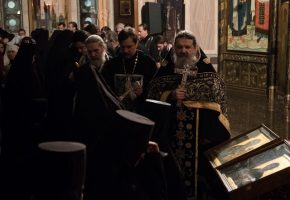There was once a woman who had a dream. In her dream she was disappointed, disillusioned and depressed. She wanted a good world, a peaceful world, and she wanted to be a good person. But the newspaper and television showed her how far we were from such a reality. So she decided to go shopping. She went to the mall and wandered into a new store – where the person behind the counter looked strangely like Jesus. Gathering up her courage she went up to the counter and asked, “Are you Jesus?” “Well, yes, I am,” the man answered. “Do you work here?” “Actually,” Jesus responded, “I own the store. You are free to wander up and down the aisles, see what it is I sell, and then make a list of what you want. When you are finished, come back here, and we’ll see what we can do for you.”
 So, the woman did just that. And what she saw thrilled her. There was peace on earth, no more war, no hunger or poverty, peace in families, no more drugs, harmony, clean air. She wrote furiously and finally approached the counter, handing a long list to Jesus. He skimmed the paper, and then smiling at her said, “No problem.” Reaching under the counter, he grabbed some packets and laid them out on the counter. Confused, she asked, “What are these?” Jesus replied: “These are seed packets. You see, this is a catalogue store.” Surprised the woman blurted out, “You mean I don’t get the finished product?” “No,” Jesus gently responded. “This is a place of dreams. You come and see what it looks like, and I give you the seeds. Then you plant the seeds. You go home and nurture them and help them to grow and someone else reaps the benefits.” And then she woke up.
So, the woman did just that. And what she saw thrilled her. There was peace on earth, no more war, no hunger or poverty, peace in families, no more drugs, harmony, clean air. She wrote furiously and finally approached the counter, handing a long list to Jesus. He skimmed the paper, and then smiling at her said, “No problem.” Reaching under the counter, he grabbed some packets and laid them out on the counter. Confused, she asked, “What are these?” Jesus replied: “These are seed packets. You see, this is a catalogue store.” Surprised the woman blurted out, “You mean I don’t get the finished product?” “No,” Jesus gently responded. “This is a place of dreams. You come and see what it looks like, and I give you the seeds. Then you plant the seeds. You go home and nurture them and help them to grow and someone else reaps the benefits.” And then she woke up.
Great Lent may be considered a “field of dreams” where we are presented to both a vision of the final product, in our case heaven, and the seeds which need to be planted in order to get there. If there is one seed that is the greatest and most beneficial it must be love. James writes in his epistle, “If you indeed fulfill the royal law according to the Scripture, “You shall love your neighbor as yourself,” you do well; but if you show partiality, you work sin, being convicted by the law as transgressors (James 2:8-9).” St. James knew that for Christ’s teaching on love to be perfected it had to be universal. The “rich” and the “poor” are to be loved equally. Every person is to be loved regardless. Lent also is considered a “school of repentance” and the course will inevitably lead us to planting seeds in places we never would think. Those who are dear to us and those who are considered enemies are both gardens deserving of love. One of the most difficult lessons in spiritual life is taught to by those who insult and offend us. God allows and sometimes even sends individuals to us who can either lead us to heaven or hell depending in our response. As St. John Chrysostom has said, “Take away the contestant and you take away the opportunity for the crowns.” Lent begins with forgiveness (with forgiveness Vespers, 5:00 PM, March 9) and ends with the Pascha liturgy and a final call for us to love one another so that we may proclaim together, “Christ is Risen from the dead!”
The seed of forgiveness begins with understanding that the gospel requires us to love others in the same way we love ourselves. St. John Chrysostom asked his congregation to consider the manner in which we love ourselves: “We do not envy ourselves; we wish all good things for ourselves; we prefer ourselves before all; we are willing to do all things for ourselves. If also we were inclined in the same way towards others, all grievous things are brought to an end; there would be no enmity; there would be no covetousness: for who would choose to get the better of oneself – no person would be at odds with another. And if we do this, the remembrance of injuries would have no place: for who would choose to remember injuries against oneself? Who would choose to be angry with oneself? Do we not make allowance for ourselves most of all?” We are called to employ the same standards we have for ourselves with others. What makes planting this seed possible is knowing ones’ personal woundedness.
We are all wounded. If we were not wounded by sin, Christ would not have had to come and save us on the Cross. If we were not wounded by sin, we would all get along; there would be no arguments, disagreements, strife or divisions amongst us. Knowing one’s “woundedness” is an important part of reaching the dream of perfection, unity, forgiveness and love. If we wish to see the dream become a reality this must become a common goal for all. What deals death blows to communities is that wounded individuals fall into two categories, those who want to be healed and those who rather heal everyone else and ignore their own woundedness. Still, those who want the healing embrace every opportunity and begin with themselves. Taking the “log” out of ones’ eye precedes taking the splinter out of my neighbors’ eye (Matthew 7:3-4). The process of removing that which blinds us, (a log in the eye) is directed toward a personal spiritual blindness. ‘I cannot see my sins, I don’t know them, God show me my sins!’ This is how we remove our many logs. We cannot do this alone. Self-directed healing is to be avoided – no matter what. Choosing ones’ spiritual director can be very dangerous because we most likely avoid those who we fear will tell us the truth. We rather submit ourselves to our own judgment then submit to the priest God has placed us under. The priest is himself a wounded healer who does not judge but offers medicine based on the personal experience his seeking healing. Both are penitent sinners, who must appear before God and stand or fall based upon what they have done. Confession is a voluntary standing before God that is done in anticipation of that final appearance. The goal is the healing of wounds.
Christians who are in the process of healing experience freedom from negative behaviors often characterized by destructive habitual behaviors (passions). Joy and happiness are what most people desire in life. Joy that comes from the deep well of God’s love is the most powerful experience a human being can have. It raises us up above the mire of a world that is full of the consequences of sin. Christians in the process of healing have no fear about the ills of society because Christ has overcome them all. His grace and Holy Spirit change lives and bring light to the darkness around us. We know this to be true because we have experienced it first hand. Christians who avoid healing only see gloom, despair, darkness, and consequently deny the power of God by their world view. Christians in the process of healing allow goodness, hope and God’s love to overshadow the darkness in the world. God’s love is all around us, it is what inspires our dreams for a prefect world and it is the gift of the Church – it is heaven on earth.
May our dreams for a perfected spiritual life be provided all of right seeds to make it happen.
Source: Assumption Greek Orthodox Church

















